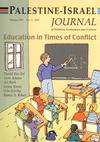Editorial
How can one seriously envision educating for peace when strife and
violent confrontation are the daily bread of the people concerned?
In the present climate of distrust and violence, it is not easy at
all to promote the teaching of tolerance, of mutual respect and
understanding, without which educating for peace remains a Fata
Morgana. But that does not mean that such efforts should not be
encouraged, tried, and put into practice whenever possible.
If one wants to discuss, as we try to do in this issue, how - if at
all ¬textbooks used respectively in Israeli and Palestinian
schools are, or are not, conducive to education for peace, three
general preliminary comments are in order. First, while Israel has
had fifty or so years since its establishment in 1948 to write and
rewrite its curriculum, the Palestinian National Authority (PNA)
has been in existence for a mere six years; it is not yet a state
and does not dispose of an adequate budget to introduce the
necessary civic reforms,
read more ...
